Marxism, marxism everywhere
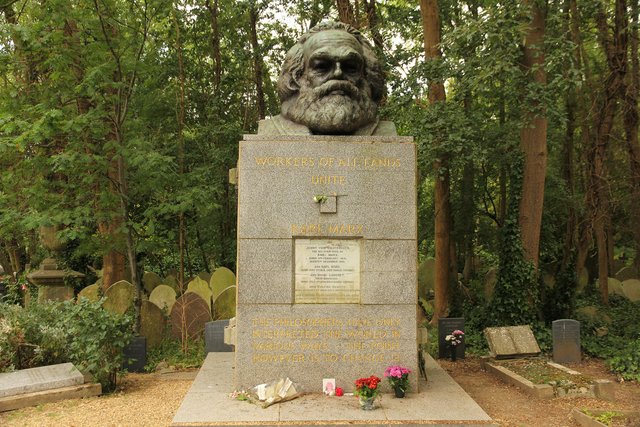
I already know that many people might dislike me because of this post. Why? Because "cultural Marxism" is a topic that attracts mainly two groups of people - those that believe that it's real and don't want to hear that it might not be, and those that just laugh at the idea of something like "cultural Marxism", claiming that it does not exist, and it's a conspiracy theory. Of course, I am sure that there are other people, with a healthier attitude to this topic, but I am afraid that they are in the minority. That's why it seems hard to write about cultural Marxism, without standing on one or the other side of this conflict and gaining approval of one or the other side. And I can not say that I support either of the mentioned groups, so both of them might not like what I will write. Regardless, I need to write about it because I wanted to do so since a long time ago, and I don't want to self-censor myself.
To anyone who would like to criticize my post: every criticism is welcomed. I assure you, that it's not my intention to be biased here. My take on "cultural Marxism" is a critical one, it is true. It doesn't mean that I want to support everything that is associated with "leftists" or I am hostile to the "right" of the political spectrum. I don't write this post to defend some political agenda. I did some research while creating this post and while doing it I had to contest my own beliefs or convictions about cultural Marxism. Some were confirmed, some not.
Peterson about "strawman vs ironman" as seen in Dostoyevsky. In his books, characters that stand for the antithesis of what Dostoyevsky actually believes are often strongest, smartest and sometimes the most admirable people in the book. He does not make it easy for him by creating villains that are stupid and weak
I try to play by the honorable rule called "steel man" also called "iron man", which is the reverse of "straw man". A straw man means presenting the argument of our opponent as weaker than the argument is in fact. So then we can refute this "straw man" that we've created and can say that we "won" the debate. Steelman is the reverse of this - to "steel man" argument means to present its best and strongest version, even make it a little better argument than our opponent made it. On one side, it is intellectual honesty, on the other, after meeting that argument we can be sure that we were not avoiding criticism and our beliefs truly survived. Or if the opponent's steel maned argument was better than ours, then we know that maybe we have to admit that we were wrong.
Ok, so finally to be precise, what I will write about here today?
What I will write about - cultural marxism
There is no official definition of "cultural Marxism", even on Wikipedia. Wikipedia mentions cultural Marxism on a page about "Frankfurt school" but it does so by calling it an "antisemitic conspiracy theory"^. Frankfurt school is a colloquial name for the school of social theory and critical philosophy associated with the Institute for Social Research. They were doing research about Marxism and were considered by some a cradle to the idea of cultural Marxism. Despite the fact that there is no official definition, there are more or less amateur attempts to define cultural Marxism. So the idea of cultural Marxism really exist and you could hear it in some political discussions. Usually, people that use this concept are associated generally with "the right" (I say "generally" because I don't want to pigeonhole and generalize views of different people that use the concept of cultural Marxism). Authors that use this concept usually say that Marxists ideas are presently implemented in the west by the establishment. Ideas that are of course, according to those people, bad and even tragical in consequences and are implemented under the cover of many other phenomenons that are not even close to Marxism at first glance, for the average Joe. The average Joe, who associate marxism mainly with communism and not much else. So under the cover of cultural Marxism, we could find:
- supporting the LGBT community,
- supporting multiculturalism, mass immigration,
- political correctness,
- alleged attacks on the "institution of family",
- "war on religion", war with national values, conservative ones,
- so-called "gender", in every meaning of this word,
- introducing of sexual freedoms, legalizing abortion,
- atheism
We can see that those things might be called by many with a simple and recently fashionable word in politics - "leftism".
Genesis
What are the roots of cultural Marxism? The general theory is that the Marxists, after failing to perform revolutions using "traditional" methods, decided to change methods and started to organize the revolution or changes in society by the culture. Ideas and goals of Marxism were kept, but the battlefield changed. So in other words methods changed. As it was said by a person from my country, Dariusz Rozwadowski, who wrote the book "Cultural Marxism", the workers failed as the tool of revolution, so Marxists had to find "new proletariat". He claims that they found it among feminists, rebellious youth, anti-nuclear activists, pacifists and sexual minorities.^
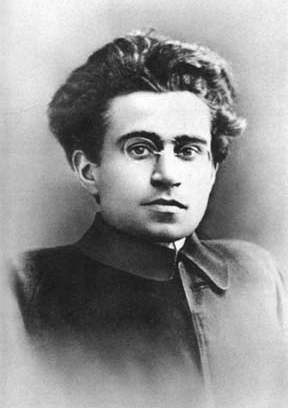
Antonio Gramsci
Some sources recognize Antoniego Gramsci as the father of cultural Marxism. He is an Italian historian, journalist, and politician, philosopher, communist theoretician. As is claimed by website staraprawda.com, Gramsci said that:
"west needs to be "dechristianized", said Gramsci, by doing the „long march through the culture”^
Gramsci was a communist who under the Mussolini has been imprisoned (there are preserved many letters that he sent from prison to wife and sons^). His views assumed that Christianity needs to be replaced by communism and that there is a need to wage a "war of position" as he called it^ But he does not invent the concept of "long march through the institutions". This name was invented by Rudi Dutschke who was born 3 years after Gramsci died, and who was a prominent spokesperson of the German student movement of the 1960s.^ Please note, that cited sources, and for example, controversial polish priest Jacek Międlar^ mistakenly call it a "long march through the culture". There is no such concept, and I believe that this is a mistake that they replaced "institutions" with "culture", or they did it on purpose, so it would fit better to the idea of cultural marxism.
Some sources claim that Gramsci before the death converted and accepted Christianity. But even Christian sources say that there is no proof that this actually happened.
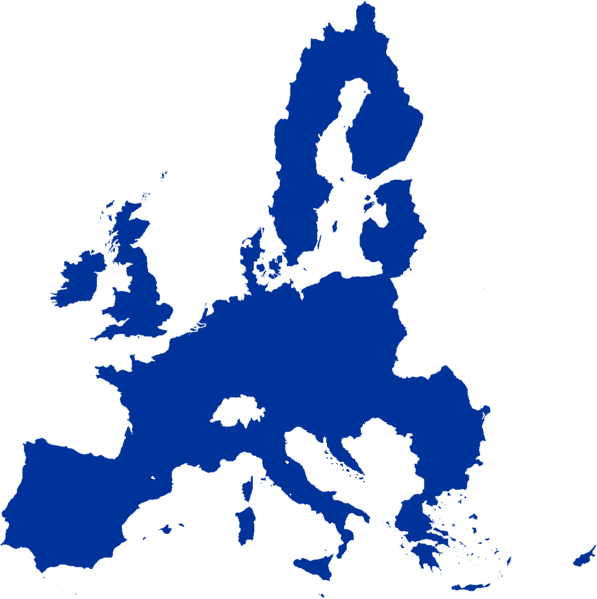
So what's next? Frankfurt school and i "Eurocommunism". As to the former, let me use Wikipedia definition:
school of social theory and critical philosophy associated with the Institute for Social Research, at Goethe University Frankfurt. Founded in the Weimar Republic (1918–33), during the European interwar period (1918–39), the Frankfurt School comprised intellectuals, academics, and political dissidents who were ill-fitted to the contemporary socio-economic systems (capitalist, fascist, communist) of the 1930s. The Frankfurt theoreticians proposed that social theory was inadequate for explaining the turbulent political factionalism and reactionary politics occurring in ostensibly liberal capitalist societies in the 20th century. Critical of capitalism and of Marxism–Leninism as philosophically inflexible systems of social organization, the School's critical theory research indicated alternative paths to realizing the social development of a society and a nation ^
And Frankfurt school is accused of being one of main home to the idea of modern Marxism. This is the place where "critical theory" was created. Critical theory is a concept that includes many theories that analyze and criticize culture and society. Many well-known thinkers come from this environment, such as Erich Fromm or Adorno. But their ties to Marxism disqualify them in the eyes of people that believe in cultural Marxism.
So what about Eurocommunism? In brief, the European Union is by some considered to be an instrument for communists in the plan of implementing communists ideas in Europe. You probably met people who believe that things with the EU are like that. For many it is because of "Ventotene Manifesto" wrote in 1941 by three antifascists, communists intellectuals (Spinelli, Rossi, and Colorni), who proposed the creation of a union of European countries, a union which would create a common policy for all the countries. Why? They claimed that it would fix fascist and nationalist aspirations of European nations, would prevent further wars like world war II (remember that it was in 1941, probably many were afraid of another world war). As we can see, the development of economic dependences inside Europe probably done what Spinelli and others wanted to achieve, we don't have wars inside of Europe right now. But "Ventotene Manifesto" mentioned something more than economic dependencies, it postulated deeper interference into the countries independence^. That's why I'm not surprised that in many circles that manifesto if considered a bad thing. They see in this manifesto wrote by three communists ideological basis for the European Union, and that's why they consider European Union communist itself. Despite the fact that the EU in itself is not communist.

The building of the Institute for Social Research. Here a "Frankfurt school" has been established
Hammer them down
There is a polish facebook fanpage called Młot na marksizm (in English "Hammer to deal with Marxism", something like that) that deals with the topic of cultural Marxism. It created a nice scheme of dependencies between different characters and ideas through out the history that is connected to Marxism. You can see the schema here. We could find there Marx himself - both "young Marx" and "regular" one. It seems right to put two Marxs on such scheme because sometimes people change views during the lifetime and it's wise to consider the ideas of those people from a different time as ideas of different people when we are analyzing them. Marx could be seen as two people. First, as "political economist", someone who wanted to create "science" describing what is and what has to happen in the space of the economy. Engels said that Marx "invented 'laws' ruling the society", and as we know now, it is not true. Although Marx predicted that the capital will accumulate on the top layers of society. Second, Marx could be seen as Hegelian philosopher. Some people consider Hegel a source of all evil, source predating Marx. It seems that Christianity especially don't like the Hegel. For example, there is a lecture by polish professor and priest Tadeusza Guza called "There is a devil himself behind Hegel".
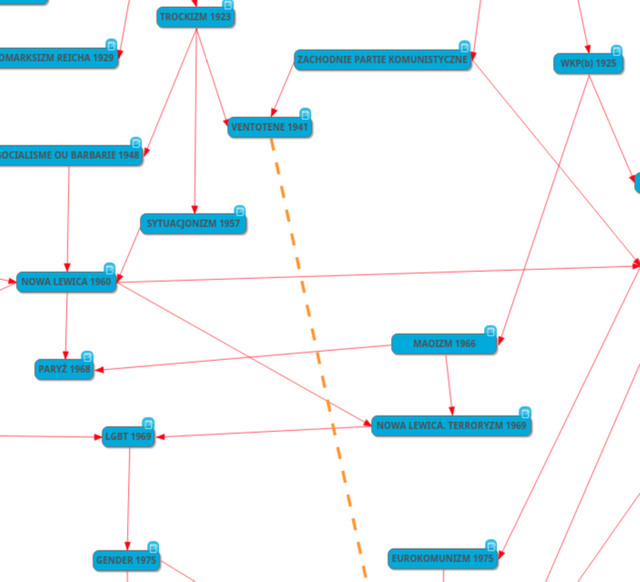
Why so many Christians don't like Hegel, it is a different topic. Let's get back to the mentioned scheme that shows us the genesis of "cultural Marxism". Despite the fact that there is no Gramsci on the mentioned scheme, it is quite impressive. It is based mainly (or only) on work done by Krzysztof Karoń, another polish figure known for his youtube movies, articles, and books on the topic of cultural Marxism. He is one of a few polish people that try to deal with this topic seriously. [You could see that I mention here many polish sources because it is my mother language, but I am pretty sure that there are similar figures in English sphere].
So, mister Karon along with the fanpage "Młot na marksizm" which is based on his work, and along with the book by Dariusz Rozwadowski called "Marksizm Kulturowy", are figures that try to be serious about cultural Marxism. Many more people are not so sophisticated and just claim that "cultural Marxism" is out there and is evil, without any significant arguments. But it's hard to not notice that the scheme that I showed above is quite complicated. Personally, I think that it's too complicated, too wide. In other words - the concept "Marxism" is used to widely and freely that we can't treat with the same attitude Leninists as the work of Eric Fromm, well-known psychologists, philosopher, psychoanalyst. Both of them are on that scheme. We can not say that "Green party" is just as bad as Stalinists, but both are present on that scheme. The same goes about beat generation and Engels, Maoism and pacifism, Woodstock and anti-nuclearism. But this is my subjective opinion which I will present at the end of this article.
Cultural Marxism according to Krzysztof Karon
I mentioned that Krzysztof Karon is one of the not many people (at least in Poland) that tries to define and research the topic of cultural Marxism. He tries to by I feel that people like him are trying to force facts and reality to fit the theory of cultural Marxism. That is few, yet important places they try to force things into the theory so the theory will not fall apart. For example, relations between different figures are sometimes forced. Some figures mentioned in that scheme are very far away from the idea of Marxism, yet they are considered a threat, part of cultural Marxism. They present us with a very vague definition of Marxism - everything can be a Marxism it seems.
My personal opinion
Jakub Zgierski, author of the "Młot na marksizm" fanpage in his interview presents us for example with the ideas that Marxism can be found in Dalai Lama. Jakub himself says that "because I am inquisitive, therefore I am looking for Marxism everywhere". Isn't it a bit too much? Some sources, including not serious ones, antisemitic and serious ones, claims that many people are part of cultural Marxism. For example mentioned Erich Fromm, psychoanalysts, etc. Some antisemitic but not serious sources claim that the goal of cultural Marxism is achieved among others by the marriages of different "races", gay rights, mass immigration or pedophilia. All those elements seem to be the part of the same "plan", one bag that they were thrown into. But of course these sources are of low quality as we can see, they are just propaganda images found on the internet. Yet, some people hold this opinion.
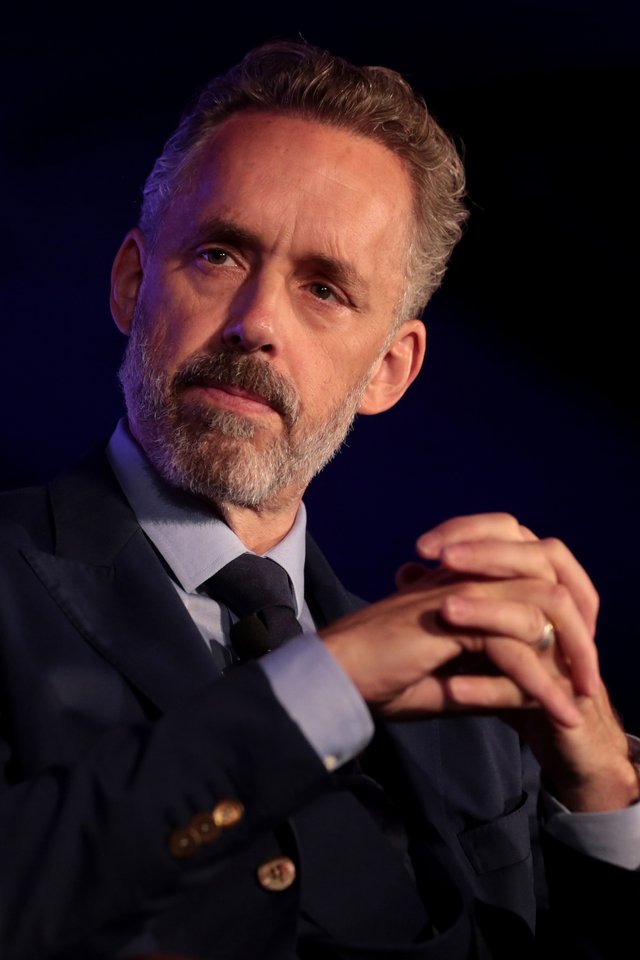
Jordan Peterson. He claims that Marxists took over western universities and destroy them with their evil ideas. But people that are experts in Marxism claim that there is not much marxism on universities
Jordan Peterson openly says that there is too much Marxism on western universities. But Richard Wolff, well known and open Marxists says, that there is not much marxism on universities of USA. There are ideas that could be connected to the Marxism using a complex scheme like the one we saw above. For example postmodernism. But it is not Marxism itself. To defend people that support the idea that cultural Marxism exists, we need to remember that the same Richard Wolff claims in his lectures, that there is no such thing that one Marxism. There are marxisms. And we could call by the name of Marxism many things that are not in direct relation to Marx. Adorno and other people had their own interpretation of Marxism. But... there needs to be a boundary somewhere. We can not call everything a "neo-marxism", right? On the other hand professor Raymond Geuss, popular marxism researcher claims^, that the concept of "Marxism" are many different things, for example, it could mean:
- researching theories of Marx from a historical point of view,
- Marxist doctrine, isolated from the fact that Marx was changing his views during lifetime,
- treating marxism not as a doctrine, and not viewing it through the person of Marx but as a tradition of thinking about the world in a certain, Marxist way. Similarly, as we sometimes think about Darwinism
If we consider that professor Raymond Guess says, then theories of some groups about "cultural Marxism" seems very simplistic and not much sophisticated. They are just criticizing everything that has even far relations with Marxism.
Here I start to get a little more subjective. I think that we can ask the questions, is the idea of Marxism not too vague, general, fuzzy? It might seem that this idea, the concept is an easy way to lump together everything that we don't like and call it a "Marxism". Or maybe it is a conspiracy theory? There are no central people in this theory, no one that would control the doings of Marxists. It seems implausible that throughout the generations they keep plotting to destroy the western culture from the inside. Wouldn't it be better to criticize specific ideas, problems? Such as problems with capitalism, gender, immigration policy, ecological problems, and not lumping it together into one "cultural Marxism".
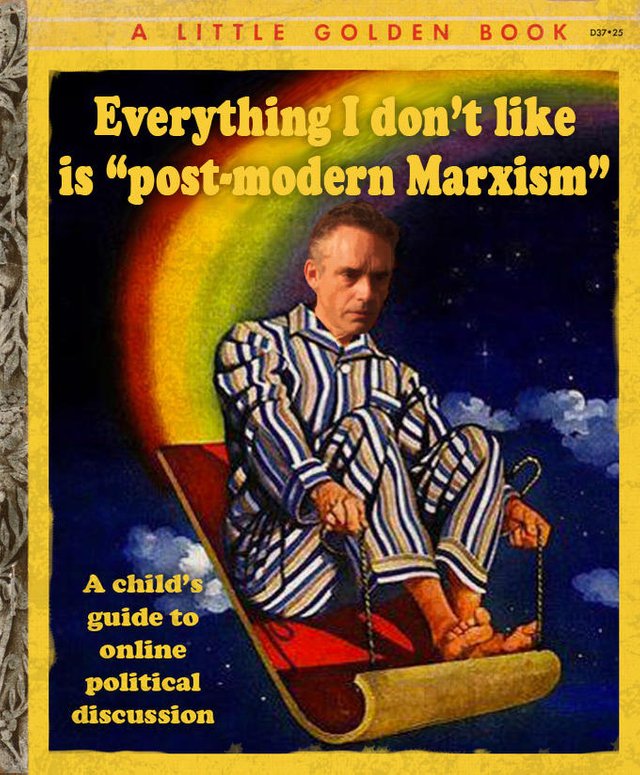
Internet meme that laughs at Peterson and others. It claims that using the concept of "cultural Marxism" or in this case "post-modern" is the sign that someone is lumping together everything that he does not like. It is based on original meme with Hitler
There is a danger that if you're a gay, atheist or someone with different views then you might be labeled as cultural Marxist. It reminds the propaganda of some undemocratic countries that try to scare us with posters about "reactionists" or "rebels wanting to destroy the culture". We can also think about the Cold War when people in the USA were trying to spot communism everywhere. To this day it is popular in the USA to discredit someone by calling him a "commie". It seems that it is intellectual laziness to lump together so many ideas and call them a "Marxism". Overall it might seem like it is not laziness, like it is even very intellectual because we use so complicated history of Marxism and complicated relations of many ideas and people to Marxism. But I still believe that in some cases it is intellectual laziness.
**Often people related to "the right" on the political spectrum, are outraged when "the left" calls some manifestation of patriotism as "fascism". And it's right that they are outraged. But I think that it is the same with cultural Marxism. You can get any liberal idea and call it cultural Marxism. It doesn't seem right.
But for some, it is all interconnected, part of some grand plan. It is one big elephant that might be called Illuminati, communists or "elite", or "masons" depending on which part you see - the leg of the elephant, the tail, trunk. Just as in Chinese proverb about the blind people touching the elephant. It is pictured in this propaganda poster.
Criticism found in the internet

On the website called rationalwiki.org, you could find similar criticism. You could find there that cultural Marxism generally refers to one of two things::
- extremely rarely — "cultural Marxism" (lower C, upper M) refers to an obscure critique of popular culture by the Frankfurt School, framing culture as being imposed by a capitalist culture industry and consumed passively by the masses.
- in common usage in the wild — "Cultural Marxism" (both uppercase) is a common snarl word used to paint anyone with progressive tendencies as a secret Communist. The term alludes to a conspiracy theory in which sinister left-wingers have infiltrated media, academia, and science and are engaged in a decades-long plot to undermine Western culture. Some variants of the conspiracy allege that basically all of modern social liberalism is, in fact, a Communist front group.
So we are dealing with the concept that claims, that:
Frankfurt School wasn't just an arcane strain of academic criticism. Instead, the Frankfurt School was behind an ongoing Marxist plot to destroy the capitalist West from within, spreading its tentacles throughout academia and indoctrinating students to hate patriotism & freedom. Thus, rock'n'roll, Sixties counterculture, the civil rights movement, the anti-war movement, homosexuality, modern feminism, and in general all the "decay" in the West since the 1950s are allegedly products of the Frankfurt school.
The End
I wanted to once again claim, that my own personal opinion and facts that are stated are two different things. I tried to make this as no biased as I could, but I presented my personal opinions nonetheless. Please, make your own opinion about cultural Marxism. I wanted this article to help people understand what is the idea of cultural Marxism when they will hear it in some political debate. It's a quite complicated topic. If you like it, I am glad. Please leave a comment, even, or especially when you don't agree with me :)

source of images: main, gramsci, europe, ifs building, peterson, eye, separator